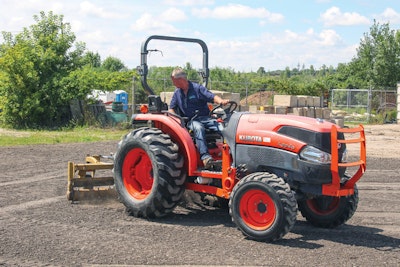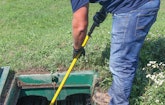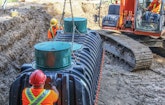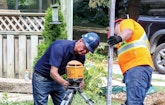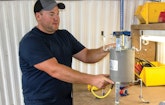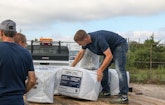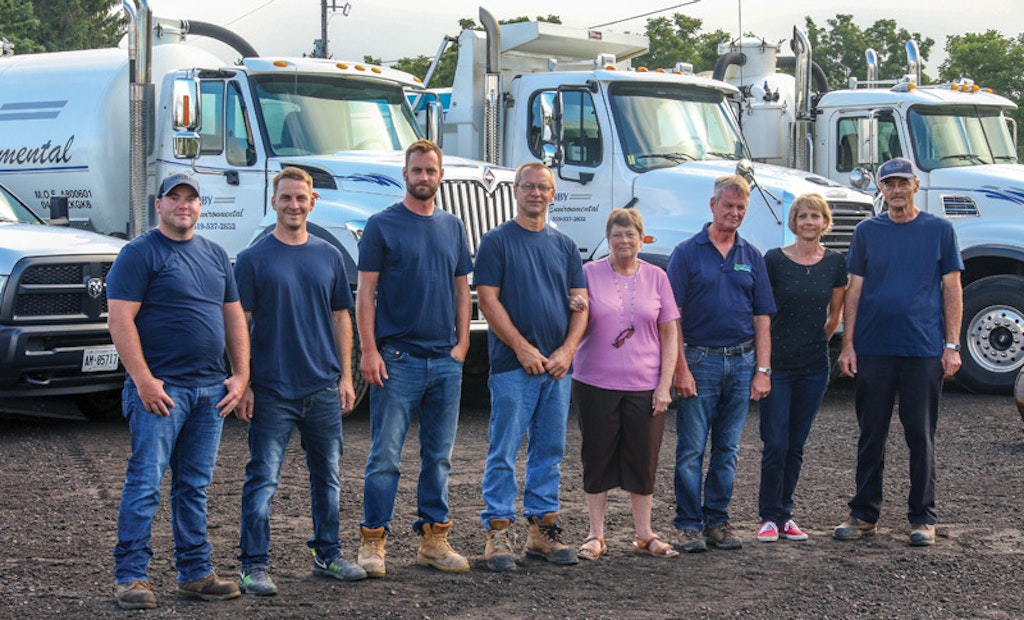
Interested in Systems/ATUs?
Get Systems/ATUs articles, news and videos right in your inbox! Sign up now.
Systems/ATUs + Get AlertsChange comes slowly but steadily in rural areas, and that is how Denby Environmental Services grew during the past few decades in Beachville, Ontario, Canada, about 80 miles southwest of Toronto. Denby has not rushed or fought to quickly build a secure niche for itself. Owners Gerry and Amy Knoop have instead followed a measured strategy: listening to their customers, adding services according to demand, and sometimes limiting what they do in order to ensure that service remains top-notch.
Onsite installations in the area are split evenly between conventional septic and advanced treatment units. “More often than not it comes down to how many dollars the homeowner chooses to spend,” says Adam Knoop. He is one of Gerry and Amy’s sons, and works in the family business with his brother, Tim.
There are other factors, Gerry says. Some municipalities require ATUs. There are many small lots and properties in or governed by the rules for protected lands such as conservation areas. And sometimes customers want nothing other than an ATU because they are concerned about protecting the environment. Customers could live on farms or rural properties and in small towns with community systems consisting of individual septic tanks feeding a common sewer pipe.
WORKING THE TERRITORY
Denby also does larger projects. Two recent jobs were at mobile home parks. One used a large Enviro-Septic system from Presby Environmental and the other employed 20 Ecoflo units from Premier Tech Aqua. Both systems handle flows of more than 12,000 gpd. Good relationships with the engineers who design these systems help the company bid successfully on these big projects. The Knoops are able to evaluate the site, do soil tests, and then bid.
Employees like the larger jobs, too, Amy says, because they know what’s ahead for each day and know their work location for a few weeks. “Being in the service industry that is not always possible. Most days we receive a request from a customer who needs something looked after right away, so plans change in order to accommodate them.”
The company has been asked to install systems at a distance but tends to restrict itself to about a 60-mile radius. Further out, installations can be impractical because they can require overnight lodging, Gerry says. When that cost is factored in, contractors closer to the job may have a lower bid.
For maintenance it’s a different story. A smaller service vehicle — such as the company’s four-wheel-drive Honda CR-V or Subaru Forester — can handle a trip of 60 or 120 miles for ATU maintenance. Denby has contracts to maintain about 1,000 ATUs from various manufacturers. An aid to doing this business is being certified on systems, Gerry says.
That puts Denby on manufacturers’ lists of approved providers. If a local contractor finds a job that is beyond his expertise, Denby may get the call to help.
THERE WHEN YOU NEED US
Calls are important in the Denby office. They’re so important that the Knoops abandoned automated answering years ago. In a time when people regularly talk to answering machines with multilevel option menus, Denby went another direction.
“We feel that our customers would like to hear a voice. Everyone wants to talk to a person,” Gerry says. “We learned years ago that when people reach an answering machine they tend to get frustrated with having to wait for a response. They may just hang up, and we have lost a potential customer. When they are having problems with their septic they like to have an answer right away.’’
During the day — between 7 a.m. and 6 p.m. — a receptionist answers the calls. If she can’t provide an answer, she forwards the call and takes a message. Existing customers are happier and some people become customers because of the personal service. When a customer has an emergency, that human contact can prevent frustration from building, which makes the technician’s job easier when they arrive at the work site, Gerry says. Calls after hours and on weekends are forwarded to Gerry’s cellphone.
Gerry has had people call, text and email about their problems, and he is always happy to help.
Many of the issues are resolved with a phone call. And while those calls may not result in immediate business, they’re a time investment in building the business, according to Gerry.
“I’ve had customers call who lived a good distance away. If you can talk them through a problem, many are able to fix it themselves. You save them a service call charge and maintain a good relationship with the customer,’’ he explains. “When that customer encounters a problem he cannot handle, he’ll think of us.”
Another part of the company’s service emphasis is handing out educational materials, some from the provincial government, some from the Ontario Association of Sewage Industry Services, some from the Ontario Onsite Wastewater Association — where Gerry serves on the board of directors — and some based on information the Knoops compiled themselves.
SPREADING THE WORD
Human contact extends to advertising. “We like to think a lot of our business comes from referrals,” Gerry says.
Recently, the company started doing more advertising by improving its website, renting a mobile sign along a two-lane county road with steady traffic, and more effective signage on its trucks. They know the mobile signs work because people call and say the sign reminded them to have a tank pumped.
Denby uses online phone book advertising, Amy says, and they pay for the print listing, because it is a nominal additional amount. “We did a little research before signing up again this year and found that many of our local competitors still use the Yellow Pages. We have also started a Facebook page. It is fairly easy and inexpensive advertising for the time being.”
Denby has not yet explored the various computer and smartphone technologies available for the industry, Gerry says. All of the employees carry company iPhones, and although he knows there are many software tools available, he and his family haven’t taken the time to dig into them. Currently they use Streets & Trips software from Microsoft (now discontinued) to route vehicles on service-maintenance trips.
One favorite piece of technology is their GPS transmitters from Global Fleet Management. Each truck has one, which makes it easier to dispatch the nearest truck to a call. In one instance, it helped Gerry reassure a customer who had expected service at a specific time. “I had a call from a man at a park who had been waiting 15 minutes for my driver to show. I told him he should have been on site by this time, so I checked the GPS tracking app. Sure enough, he was on site, working at a different location from where the gentleman had been calling.”
BUSINESS ROOTS
The family business began in the 1970s, when Gerry opened Knoop Landscaping to earn more money for his family, who emigrated from the Netherlands to Canada 10 years earlier. When his father, also named Gerry, became unemployed, Gerry Jr. headed out to work other jobs, and left his dad with the now-sustainable landscaping business. In 1990, Gerry Sr. acquired another family enterprise, Denby Sanitation, from owner Jud Denby. Gerry Jr. primarily worked in the welding industry, but helped out with the family business. After Gerry and Amy married, she did the bookkeeping for the company.
In 2001, Gerry Jr. returned to take up the family business as his father retired, and for a few years worked in partnership with his brother. Since 2008, the company has been co-owned by Gerry and Amy.
“Being in another industry was good. It was a great experience where I learned a lot from both the customers and my boss. But the family business is better; working together, dealing with the environment, and helping to protect it,” Gerry says.
Lately, the company has been doing more landscaping work based on customer demand. The business is currently split about evenly between installing, pumping and maintenance, and landscaping.
You may have seen Denby’s newest vacuum truck at the 2016 WWETT Show. It’s a Vacutrux unit built on a Dodge Ram 5500 chassis. There’s a 1,000-gallon galvanized tank split to carry 600 gallons of wastewater and 400 gallons of freshwater. This is the vehicle for the company’s new venture in portable sanitation.
In addition, the company has:
- A 2007 Mack with a 4,400-gallon galvanized tank.
- A 2009 International with a 3,400-gallon galvanized tank.
All the trucks were built by Vacutrux and carry Elmira Machine Industries / Wallenstein Vacuum pumps. The 2007 Mack has dual pumps to efficiently remove peat media from Ecoflo Biofilters.
Installation work is done with a Hitachi 160 excavator, Bobcat E32 and E35 mini-excavators, a Bobcat T190 skid-steer, Kubota L3940 tractor and a Case 450 bulldozer. A 2014 Freightliner tri-axle dump truck and a 5-ton International single-axle dump truck, with boxes from Wiltsie Truck Body in Alymer, Ontario, handle the hauling work.
CONSTANT DIVERSIFICATION
The Knoops began looking into portable sanitation after customers inquired about rentals.
Presently they have a Comfort Station single restroom model from McKee Technologies - Explorer Trailers and about 20 portable restrooms from PolyJohn Canada. In the beginning, technicians were servicing the units with one of the large vacuum trucks, but that was impractical for restroom pickup and delivery, and because the septic trucks had no onboard freshwater tanks for restroom servicing, Gerry says.
At the moment, they’re still feeling out the market, with most units going to small construction sites. The addition is not unlike other successful business niches they’ve built over the years. Try something new and perhaps it will lead to an expanded customer base.
“We faced a choice to commit to delivering the service, buy the necessary equipment, and give it a shot, or to give up,” he says. “We committed.”
Coping with the winter slowdown
When the Canadian winter sweeps in, system installations come to a halt, along with a good deal of other work at Denby Environmental Services. Yet the company has remarkable longevity in its employees — two have been around for close to 25 years — because owners Gerry and Amy Knoop make the effort to provide for them.
In the offseason, three people in the shop are sufficient to handle the wastewater work coming in, and to perform necessary equipment maintenance. For years, other jobs kept the rest of the workers busy in the offseason.
“We used to do snow removal just to keep our staff employed, and we had a major contract with General Motors, a contract we held for more than 30 years. But when the automotive industry took a plunge, they were looking to save money, and we were not successful in working with them on the price,” Gerry says.
Now they believe it was a blessing for the company because everyone was tired of doing snow removal. Denby had to maintain a separate set of equipment — snowblowers, plows and pickup trucks — and had to carry extra insurance.
“When we lost the contract, I learned quickly who obtained that business. I got on the phone and said, ‘Look, I have equipment and I have people, and we’re not competing with you.’”
For the last five years, four Denby employees have worked for another company during the winter. They are employed four to five months clearing snow, maintaining sidewalks and parking lots for the new Toyota plant in Woodstock, Ontario.
“We have an understanding with that company. They take them through the winter and we take them through the rest of the year,” Amy explains. “And we’ve had those guys since the early ‘90s. As a small business you feel a sense of obligation. You want to keep them employed. Everyone has families and bills to pay.”
And Denby saves in another way because it does not have to recruit and train replacements for employees who leave to find full-time work.
